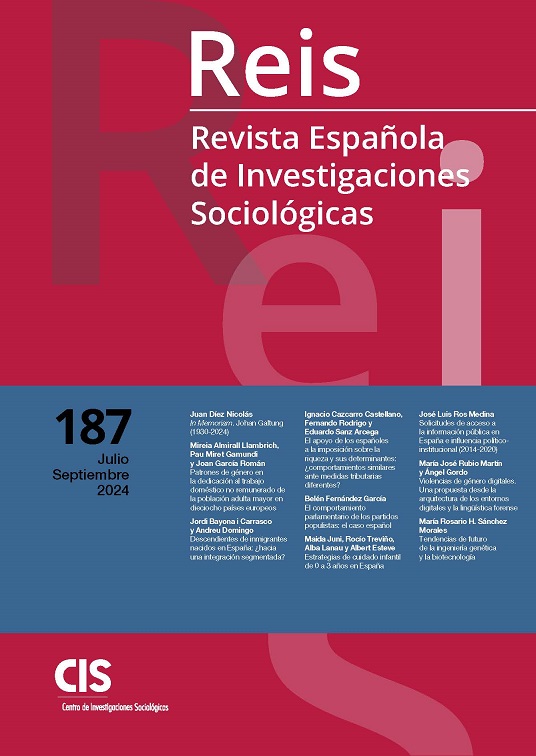The Parliamentary Behavior of Populist Parties: The Spanish Case
DOI:
https://doi.org/10.5477/cis/reis.187.65-86Keywords:
Agenda, Parliament, Political Parties, Podemos, Populism, VoxAbstract
This paper analyses the behaviour of the populist parties in the Spanish Parliament. This involved examining the type of initiatives
submitted and the voting patterns in the chamber, as well as the themes in the agendas of two parties, Unidas Podemos and Vox,
in the 12th and 14th parliamentary terms. The literature suggests that populist parties engage in defiant and uncooperative behaviour in institutions and proposed differentiated and concentrated parliamentary agendas. However, I argue that this behaviour can be nuanced by contextual, ideological and strategic factors. The analysis suggests that the Spanish populist parties reproduce and amplify pre-existing ideological and territorial divisions in the legislative institution, instead of introducing new logics of conflict (e.g., populism/anti-populism).
Downloads
References
Akkerman, Tjitske; De Lange, Sarah L. y Rooduijn, Matthijs (eds.) (2016). Radical Right-wing Populist Parties in Western Europe: Into the Mainstream?. Routledge. DOI: https://doi.org/10.4324/9781315687988
Borghetto, Enrico (2018). «Challenger Parties in Parliament: The Case of the Italian Five Star Movement». Italian Political Science, 13(3): 19-32.
Boydstun, Amber E.; Bevan, Shaun y Herschel, Thomas F. (2014). «The Importance of Attention Diversity and How to Measure It». The Policy Studies Journal, 42(2): 173-196. doi: 10.1111/psj.12055 DOI: https://doi.org/10.1111/psj.12055
Canovan, Margaret (2002). Taking Politics to the People: Populism as the Ideology of Democracy. En: Y. Mény y Y. Surel (eds.). Democracies and the Populist Challenge. London: Palgrave Macmillan. DOI: https://doi.org/10.1057/9781403920072_2
Cavalieri, Alice y Froio, Caterina (2022). «The Behaviour of Populist Parties in Parliament. The Policy Agendas of Populist and Other Political Parties in the Italian Question Time». Italian Political Science Review / Rivista Italiana di Scienza Politica, 52(3): 283-296. doi: 10.1017/ipo.2021.25 DOI: https://doi.org/10.1017/ipo.2021.25
Chaqués-Bonafont, Laura; Baumgartner, Frank R. y Palau, Anna (2015). Agenda Dynamics in Spain. London: Palgrave. DOI: https://doi.org/10.1057/9781137328793
Fernández-García, Belén y Valencia-Sáiz, Ángel (2022). «De la calle a las instituciones: la evolución del mensaje populista de Podemos (2014-2019)». Revista de Estudios Políticos, (195): 97-123. doi: 10.18042/cepc/rep.195.04 DOI: https://doi.org/10.18042/cepc/rep.195.04
Fernández-García, Belén y Valencia-Sáiz, Ángel (2023). Populism in Southern Europe. En: C. García-Rivero (ed.). Democracy Fatigue: An Eastern Europe epidemy. Central European University Press. doi: 10.1515/9789633866405-013 DOI: https://doi.org/10.7829/jj.4032512.15
Lewandowsky, Marcel; Schwanholz, Julia; Leonhardt, Christoph y Blätte, Andreas (2022). New Parties, Populism, and Parliamentary Polarization: Evidence from Plenary Debates in the German Bundestag. En: M. Oswald (ed.). The Palgrave Handbook of Populism. Cham: Palgrave Macmillan. DOI: https://doi.org/10.1007/978-3-030-80803-7_37
Louwerse, Tom y Otjes, Simon (2019). «How Populists Wage Opposition: Parliamentary Opposition Behaviour and Populism in Netherlands». Political Studies, 67(2): 479-495. doi: 10.1177/0032321718774717 DOI: https://doi.org/10.1177/0032321718774717
Maatsch, Aleksandra y Miklin, Eric (2021). «Representative Democracy in Danger? The Impact of Populist Parties in Government on the Powers and Practices of National Parliaments». Parliamentary Affairs, 74(4): 761-769. doi: 10.1093/pa/gsab006 DOI: https://doi.org/10.1093/pa/gsab006
Meguid, Bonnie M. (2005). «Competition between Unequals: The Role of Mainstream Party Strategy in Niche Party Success». American Political Science Review, 99(3): 347-359. doi: 10.1017/S0003055405051701 DOI: https://doi.org/10.1017/S0003055405051701
Mudde, Cass y Rovira-Kaltwasser, Cristóbal (2012). Populism and (Liberal) Democracy: A Framework for Analysis. En: C. Mudde y C. Rovira Kaltwasser (eds.). Populism in Europe and the Americas: Threat or corrective for democracy. Cambridge University Press. DOI: https://doi.org/10.1017/CBO9781139152365
Mújica, Alejandro y Sánchez-Cuenca, Ignacio (2006). «Consensus and Parliamentary Opposition: The Case of Spain». Government and Opposition, 41(1): 86-108. DOI: https://doi.org/10.1111/j.1477-7053.2006.00172.x
Olivas-Osuna, José J.; Arias-Maldonado, Manuel y Barrio, Astrid (2022). El populismo de Vox y Podemos: análisis multidimensional de dos evoluciones divergentes. En: B. Fernández-García y A. Valencia Sáiz (eds.). En los márgenes de la democracia liberal: Populismo, nacionalismo y radicalismo ideológico en Europa. Granada: Comares.
Otjes, Simon y Louwerse, Tom (2015). «Populists in Parliament: Comparing Left-Wing and Right-Wing Populism in the Netherlands». Political Studies: 63: 60-79. doi: 10.1111/1467-9248.12089 DOI: https://doi.org/10.1111/1467-9248.12089
Palau, Anna L.; Muñoz-Márquez, Luz y Chaqués-Bonafont, Laura (2015). «Government-Opposition Dynamics in Spain under the Pressure of Economic Collapse and the Debt Crisis». The Journal of Legislative Studies, 21(1): 75-95. DOI: https://doi.org/10.1080/13572334.2014.939565
Rooduijn, Matthijs (2019). «State of the Field: How to Study Populism and Adjacent Topics? A Plea for Both More and Less Focus». European Journal of Political Research, 58(1): 362-372. doi: 10.1111/1475-6765.12314 DOI: https://doi.org/10.1111/1475-6765.12314
Schwörer, Jakob; Fernández-García, Belén y Caiani, Manuela (2023). «Challengers or the Establishment? How Populists Talk About Populists». German Politics, 1-25. doi: 10.1080/09644008.2023.2207014 DOI: https://doi.org/10.1080/09644008.2023.2207014
Sigelman, Lee y Buell, Emmett H. (2004). «Avoidance or Engagement? Issue Convergence in U.S. Presidential Campaigns, 1960-2000». American Journal of Political Science, 48(4): 650-661. doi: 10.1111/j.0092-5853.2004.00093.x DOI: https://doi.org/10.1111/j.0092-5853.2004.00093.x
Downloads
Published
How to Cite
Issue
Section
License
Copyright (c) 2024 Revista Española de Investigaciones Sociológicas

This work is licensed under a Creative Commons Attribution-ShareAlike 4.0 International License.
Permite Compartir — copiar y redistribuir el material en cualquier medio o formato, Adaptar — remezclar, transformar y construir a partir del material para cualquier propósito, incluso comercialmente.








